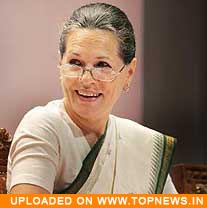Sonia Gandhi to inaugurate UNESCO Regional Conference on Global Literacy
New Delhi, Nov 29 (ANI):  Congress Party President Sonia Gandhi will inaugurate the UNESCO Regional Conference on Global Literacy here today.
Congress Party President Sonia Gandhi will inaugurate the UNESCO Regional Conference on Global Literacy here today.
Human Resource Development Minister Arjun Singh and Director General of the UNESCO Dr. Koichiro Matsuura will grace the occasion.
Dr. Shanta Sinha, Chairperson of the National Commission for Protection of Child Rights will deliver the keynote address.
The two-day conference is being organised by the Ministry of Human Resource Development, Department of School Education and Literacy with UNESCO.
The conference is a part of a series of regional conferences being organized as a follow up of the White House Conference on Global Literacy held in September 2006 hosted by Laura Bush, first lady of the United States of America and Honorary Ambassador for the United Nations Literacy Decade (UNLD).
This conference is the fourth in the series of six regional conferences being organised covering Arab States, Asia and the Pacific, Europe and the Latin America and Caribbean.
Other three conferences held earlier were at Doha in Qatar on March 12-14; Beijing, People’s Republic of China on July 31 and August 1 and Bamako in Mali on September 10-12.
The first ladies from ten countries - Afghanistan, Bangladesh, Bhutan, Kazakhstan, Kyrgyz Republic, Maldives, Pakistan, Sri Lanka, Tajikistan, and Uzbekistan have been invited to participate in the conference. As goodwill ambassadors, the first ladies will play a vital role to promote literacy in the entire region.
Education and Finance Ministers of the 14 countries of the region - Afghanistan, Bangladesh, Bhutan, India, Islamic Republic of Iran, Kazakhstan, Kyrgyz Republic, Maldives, Nepal, Pakistan, Sri Lanka, Tajikistan, Turkmenistan and Uzbekistan are among the other dignitaries expected to grace the occasion.
The conference is, therefore, of utmost importance for UNESCO and its member States and partners in their effort to achieve the goals of Education for All (EFA) and Millennium Development Goals (MDGs) and to fulfil their commitments to the United Nations Literacy Decade (UNLD) and the Decade of Education for Sustainable Development (DESD).
The conference is important for the Indian sub-continent because three highly populated countries among E-9 countries - Bangladesh, India and Pakistan continue to face major literacy challenges, including the sheer number of illiterates.
In addition to a serious gender gap, there is a high urban-rural disparity. As a key instrument for lifelong learning, indispensable for effective participation in social and economic life and essential for peace, literacy is a crucial issue in the region.
The countries of South and South West Asia have the highest number of illiterates in the world, and out of the 388 million adults in this region who cannot read and write 63.5 per cent are women.
The conference will organise five roundtable presentations on main challenges, trends, gaps, achievements and innovations in the region and make recommendations on how to promote literacy.
The five main issues to be addressed in the conference are literacy and gender; literacy policies and strategies, costs and financing; programme content and delivery; monitoring and evaluation of literacy; coalition and partnership-building for literacy and Non Formal Education (NFE).
The conference will also organise panel discussions on five themes - from literacy to lifelong learning, literacy for economic self-sufficiency, literacy for health, mother-child literacy and intergenerational learning and information and communication technologies (ICT) and literacy.
During the deliberations, the best practices adopted in India by the programme implementing agencies are going to be showcased. This will help create a favourable environment for mobilizing the learners and volunteers, for imparting skill development programmes, for promoting life long learning, to achieve convergence of different developmental programmes.
A fair on best practices is also being organized where innovative methods adopted for promoting literacy, teaching and learning materials and publications brought out by National Literacy Mission (NLM) will be showcased.
The conference aims to foster partnerships among the key stake holders i. e. decision makers, civil society organizations, community-based organizations, bilateral and multilateral organizations and private providers in the field of literacy.
The conference will ultimately lead to renewed commitment, with concrete proposals in support of activities at the country level. (ANI)